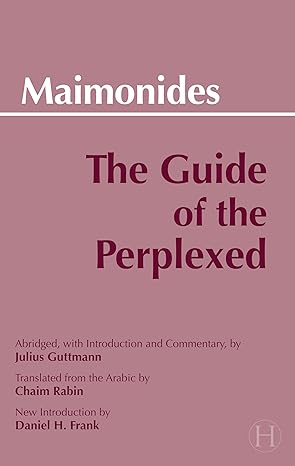Original language: Judeo-Arabic.
Born in present-day Spain, then under Muslim control. Also lived in today’s Morocco and Egypt.
I read The Guide of the Perplexed, abridged with introduction and commentary by Julius Guttman, translated from the Arabic by Chaim Rabin, with a new introduction by Daniel H. Frank. It was published by Hackett in 1995. The abridgment contains about one-fourth of the original work.

I found it funny how rudely Maimonides addresses his readers and condemns people who aren’t smart enough.
His basic project is to reconcile the Bible with Aristotelian and Neoplatonic philosophy, and also make traditional Judaism appeal to those with half a brain, who might doubt the supernatural things in the Bible. Some of the time, I agree with him (for example, that “man was created in God’s image” does NOT mean God has a body), but I think his efforts to say, for example, that God doesn’t have emotions (or any attributes) are tortured and really go against a plain reading of the Bible.
Perplexed is a strange book. Maimonides is like a Jewish Augustine. He is a devout Jew and argues for devout Judaism, but he does it using the framework of Greek philosophy. It isn’t the traditional Judaism that involves taking the Bible at face value.
I liked when Maimonides talks about the flow of intellect or revelation that some people have – that feels true. (pp 135-137). And in some people that flow is so powerful that they are compelled to write or teach and pass their knowledge on to others. In general, I liked Maimonides’s discussion of prophecy and prophets.
It is interesting that before the scientific revolution, philosophers had to deal with questions of physics and cosmology and the existence of species. A philosopher’s ambit was much bigger and his job harder.
Last thoughts on Maimonides
I don’t agree with his worship of God. And I think it’s also interesting that Maimonides’s great project is to reconcile Biblical Judaism with Aristotelian philosophy. I did learn from him that first of all, the Bible contains references to historical events (like the fall of the Babylonian dynasty), but often in metaphors. And that there are many ways to interpret the Bible that do not interpret it literally. I also found his quoting of the Talmud very interesting.
Leave a Reply